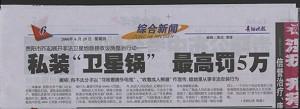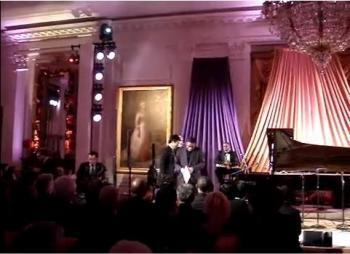An article from the Guiyang Evening News on June 30 reported that “starting on June 30, Guiyang launched actions against illegal satellite signal receiving devices. Privately installed satellite dishes will be subject to a maximum fine of 50,000 yuan” (about US$6,000).
Informants say that other cities in China will issue similar policies to strengthen control of the production, sale and use of satellite TV signal receivers.
New York City-based New Tang Dynasty Television’s (NTDTV) vice-president Samuel Zhou and renowned Guiyang Evening News commentator Zeng Ning said in an Epoch Times interview that such measures are the Chinese Communist Party’s (CCP) response to the crisis it is facing.
Mr. Zeng stated: “This policy will not produce the expected objective. Contrary to the CCP’s wishes, the more [lightning] strikes, the bigger the fire, and the more repression, the faster it will spread.
The Communist Party’s Crisis
Mr. Zhou pointed out that whenever the CCP faces a serious crisis, it always intensifies its information blockade and other controls to fortify, through its own propaganda systems, the use of nationalism, hatred against perceived enemies, and other initiatives.
Zeng said that this latest CCP policy is directly related to the CCP’s own analysis of the life or death situation it faces. With domestic crises constantly emerging because of widespread corruption and extreme disparity between the rich and the poor, and social conflicts getting more serious by the day, the people’s desire for democracy is rapidly gaining momentum.
Various media, including television, short wave, and the Internet, intensely compete for China’s market and are the “Berlin Wall” of China’s information blockade and may collapse at any moment.
CCP Policies Are Above the Law
The Guiyang Evening News reported that the policy called for “the investigation of illegal production, sales and use of satellite TV receivers” and that “the sales of satellite receivers must be approved by the related department and must be carried out at a designated location. For private installation, an application must be submitted to the broadcast department, and the devices must be purchased from designated sales locations.”
Zhou said, “The CCP had always used deceit and lofty-sounding rhetoric as a pretext for making an attack against the ‘enemy,’ for instance, citing control of pornography, illegal crimes, etc., as excuses for censoring Internet access. These are simply excuses to hide the real intent—preventing people from knowing the truth and thus maintaining its power.”
Zeng indicated that as far as he knew, the installation of the “small ear” (satellite to home receiver) did not require government approval, and there was no law against it. But the tragic reality in China is that policies are above the law. Government can issue and revise policies as such at any time, and even though these policies are not law; they are actually above the law, and are controlled at will by government officials.
Going Through the Motions Is Not Effective
Zhou said that people who understand the nature of the CCP are doing “reverse thinking,” that is, looking at the CCP’s statements from the opposite perspective. He said that the Party’s repressive measures only fan the flames of discontent. Finally, these policies and regulations are not only ineffective but are actually counterproductive to the CCP’s maintaining control.
“When a major policy was issued by the central government in the past, the related departments merely went through the motions, and the execution was over quickly... It is difficult [for the CCP] to achieve any actual results. It might even create adverse publicity by informing those who are unaware,” he said.
“Under the commercialized economic tide, and the free democratic trend of thought, the CCP regime’s administrative ability has been seriously weakened. At present, the CCP’s goal and results are hard-pressed to be in sync with each other; therefore failure is often inevitable,” Zhou added.
Popularity of Small Satellite TV Receivers
Zeng said, “It’s very popular in the Mainland China to install a personal satellite TV receiver. When traveling by train, one frequently sees satellite dishes on the roofs of houses. Generally, this kind of installation does not require government approval. It also requires too much effort for the government to monitor the large number of these small installations.
“The installation fee for most satellite receivers is not high. In the small district that I live in, there are sales of the ’small ear' receivers to local residents for 1,000 yuan to 2,000 yuan (US$120 to US$240) including installation, testing, and a warranty.
“Relative to the ones offered by the government, the privately installed ’small ear' receiver is much better in both quality and availability.”
NTDTV Is Very Popular in Mainland China
“From the many responses we receive regarding NTDTV in China, there is no doubt that the use of the ’small ear' is widespread. It is available nearly everywhere in all villages and cities in China,” Zhou said.
“Why so many? Because it is the main channel for the public to receive free information other than the Internet.”
Zhou added: “The NTDTV audience in China is enormous. The real number is hard to estimate, but conservatively, there are probably several million.
“Because NTDTV is the only Chinese broadcast not encoded, it is very appealing to many audiences in China, and therefore has the interest and attention of many Chinese who are concerned about affairs in China.”



